President William Lai (賴清德) yesterday said that China has “no right to represent Taiwan,” but stressed that the nation was willing to work with Beijing on issues of mutual interest.
“The Republic of China has already put down roots in Taiwan, Penghu, Kinmen and Matsu,” Lai said in his first Double Ten National Day address outside the Presidential Office Building in Taipei. “And the Republic of China and the People’s Republic of China [PRC] are not subordinate to each other.”
“The People’s Republic of China has no right to represent Taiwan,” he said at the event marking the 113th National Day of the Republic of China, adding that his “mission” as president was to “ensure that our nation endures and progresses” and “resist annexation or encroachment upon our sovereignty.”
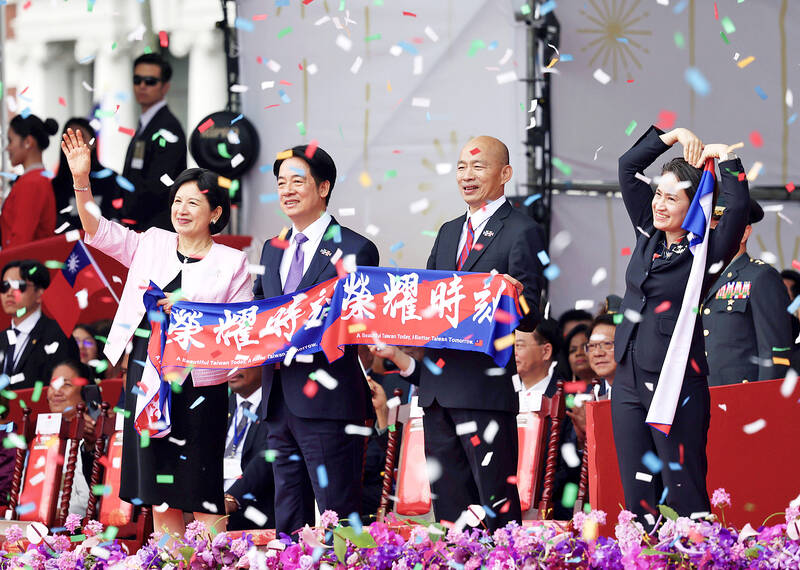
Photo: CNA
The president’s comments in front of opposition party leaders, foreign delegates and other assembled guests were in line with his inaugural speech in May, which prompted Beijing to launch large-scale military drills around Taiwan as “punishment” for so-called “separatist acts.”
However, unlike in previous remarks in which he criticized Beijing for engaging in “gray zone” activities and cognitive warfare against Taiwan, Lai’s speech did not touch upon these points.
While warning against the “expanding authoritarianism” that is “threatening our hard-won free and democratic way of life,” Lai said his administration was “willing to work with China on addressing climate change, combating infectious diseases and maintaining regional security.”
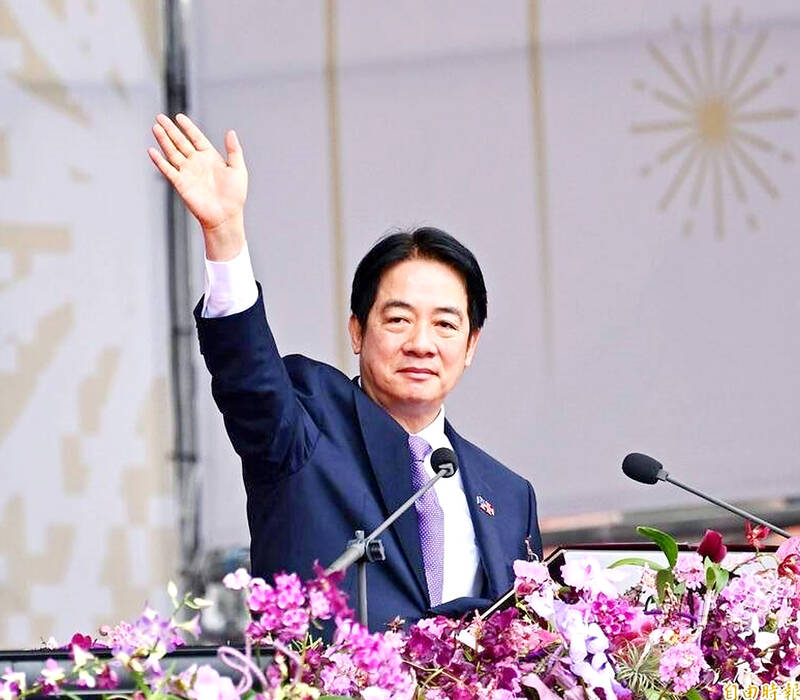
Photo: Fang Pin-chao, Taipei Times
He also expressed hope for “healthy and orderly dialogue and exchanges” across the Taiwan Strait based on the principles of “parity and dignity.”
At the same time, the president reiterated the government’s commitment to defend “national sovereignty” and “maintain the status quo of peace and stability in the Taiwan Strait” through his “four pillars of peace” plan.
The plan, first proposed by Lai while he was running for president, emphasizes the importance of Taiwan’s defensive strength, economic security, partnerships with other democracies and a consistent cross-strait policy.
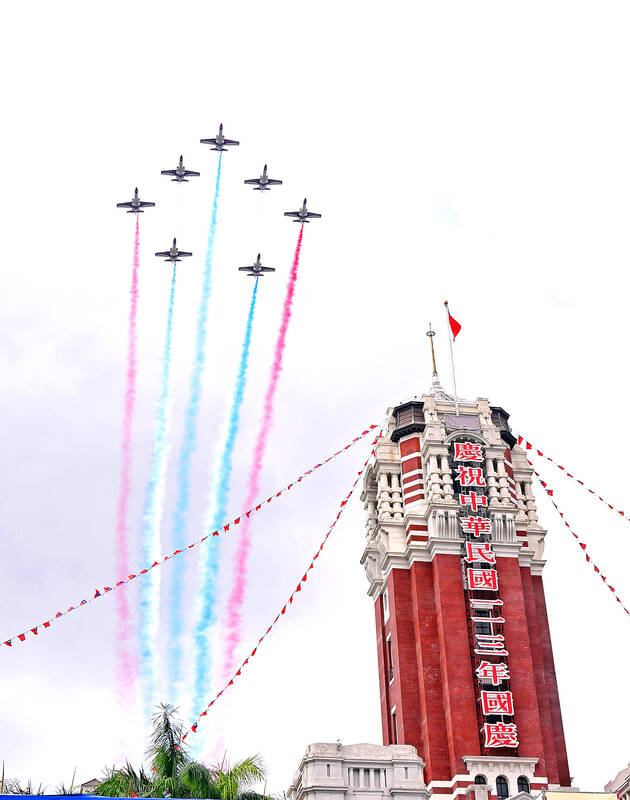
Photo: Fang Pin-chao, Taipei Times
Lai also called on the PRC to “live up to the expectations of the international community” by playing a bigger role toward ending Russia’s invasion of Ukraine and conflicts in the Middle East.
“We hope that it will take up its international responsibilities and, along with Taiwan, contribute to the peace, security and prosperity of the region and the globe,” Lai said.
The international community has “assisted” the PRC in joining the WTO, which resulted in “promoting China’s economic development and enhancing its national strength,” he said.
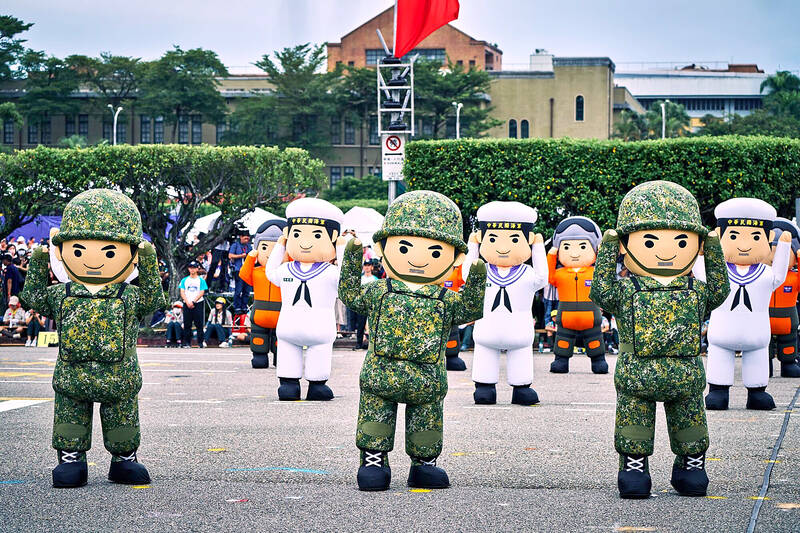
Photo: An Rong Xu, Bloomberg
“This was done out of the hope that China would join the rest of the world in making global contributions, that internally it would place importance on the livelihoods of the people and that externally it would maintain peace,” Lai said.
The PRC is facing growing pressure from Western countries over its ties to Russia and allegations it is aiding Moscow’s war efforts in Ukraine by providing dual-use goods that can have military applications.
Beijing denies this and says the West instead is fueling the conflict by supplying arms to Ukraine.
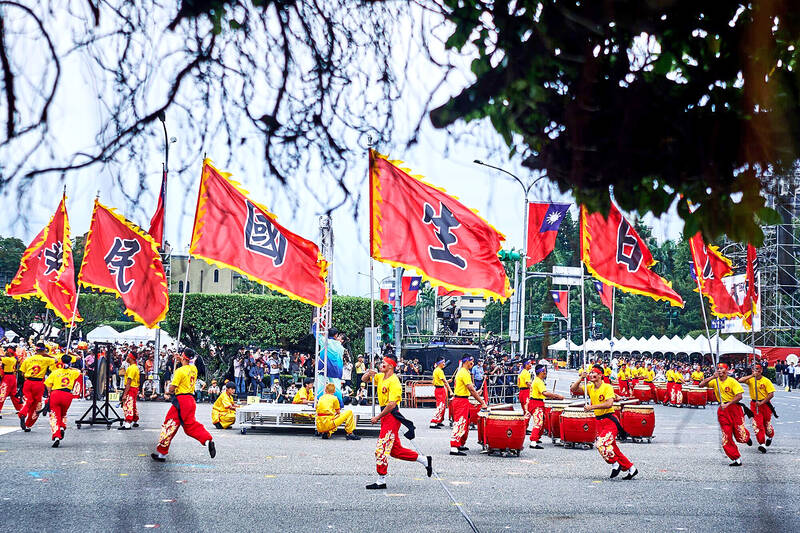
Photo: An Rong Xu, Bloomberg
Lai, whose Democratic Progressive Party won an unprecedented third consecutive presidential term while losing a majority to the opposition in the legislature in January’s elections, also called for unity among Taiwanese across party lines.
“Our nation must become more united, and our society must grow more stable,” he said.
In Beijing, Chinese Ministry of Foreign Affairs spokeswoman Mao Ning (毛寧) said Lai was “hell-bent” on independence.
Lai’s speech “exposed his hell-bent position on Taiwan independence and his sinister intention to escalate tensions in the Taiwan Strait for political self-interest,” Mao told a regular news briefing.
“Taiwan has never been a country and can never become one, so it does not have any so-called ‘sovereignty,’” Mao said.
She added that Lai’s comments “arbitrarily severed the historical connection between the two sides of the Taiwan Strait” and used “all manner of tactics to peddle the fantasy of Taiwan independence.”
Officials in Taipei have said that Beijing is likely to follow Lai’s speech with military drills, which Washington has called unjustified.
“Even though we have not seen significant military activity or exercises following previous 10/10 speeches, we are prepared that Beijing may choose to use this as a pretext this year,” a senior US official said on Wednesday.
“Again, we see no justification for a routine annual celebration to be used in this manner. Coercive actions like this against Taiwan and in the cross-strait context, in our view, undermine cross-strait stability,” the official said.
In the 24 hours ending at 6am yesterday, the Ministry of National Defense reported 27 Chinese People’s Liberation Army aircraft, nine naval vessels and five official ships operating around Taiwan.
Fifteen of the aircraft crossed the median line of the Taiwan Strait into Taiwan’s northern, central and southwestern air defense identification zone, it said, adding that the military “monitored the situation and responded.”
Additional reporting by AFP and Reuters

SECURITY: As China is ‘reshaping’ Hong Kong’s population, Taiwan must raise the eligibility threshold for applications from Hong Kongers, Chiu Chui-cheng said When Hong Kong and Macau citizens apply for residency in Taiwan, it would be under a new category that includes a “national security observation period,” Mainland Affairs Council (MAC) Minister Chiu Chui-cheng (邱垂正) said yesterday. President William Lai (賴清德) on March 13 announced 17 strategies to counter China’s aggression toward Taiwan, including incorporating national security considerations into the review process for residency applications from Hong Kong and Macau citizens. The situation in Hong Kong is constantly changing, Chiu said to media yesterday on the sidelines of the Taipei Technology Run hosted by the Taipei Neihu Technology Park Development Association. With

CARROT AND STICK: While unrelenting in its military threats, China attracted nearly 40,000 Taiwanese to over 400 business events last year Nearly 40,000 Taiwanese last year joined industry events in China, such as conferences and trade fairs, supported by the Chinese government, a study showed yesterday, as Beijing ramps up a charm offensive toward Taipei alongside military pressure. China has long taken a carrot-and-stick approach to Taiwan, threatening it with the prospect of military action while reaching out to those it believes are amenable to Beijing’s point of view. Taiwanese security officials are wary of what they see as Beijing’s influence campaigns to sway public opinion after Taipei and Beijing gradually resumed travel links halted by the COVID-19 pandemic, but the scale of

A US Marine Corps regiment equipped with Naval Strike Missiles (NSM) is set to participate in the upcoming Balikatan 25 exercise in the Luzon Strait, marking the system’s first-ever deployment in the Philippines. US and Philippine officials have separately confirmed that the Navy Marine Expeditionary Ship Interdiction System (NMESIS) — the mobile launch platform for the Naval Strike Missile — would take part in the joint exercise. The missiles are being deployed to “a strategic first island chain chokepoint” in the waters between Taiwan proper and the Philippines, US-based Naval News reported. “The Luzon Strait and Bashi Channel represent a critical access

Pope Francis is be laid to rest on Saturday after lying in state for three days in St Peter’s Basilica, where the faithful are expected to flock to pay their respects to history’s first Latin American pontiff. The cardinals met yesterday in the Vatican’s synod hall to chart the next steps before a conclave begins to choose Francis’ successor, as condolences poured in from around the world. According to current norms, the conclave must begin between May 5 and 10. The cardinals set the funeral for Saturday at 10am in St Peter’s Square, to be celebrated by the dean of the College